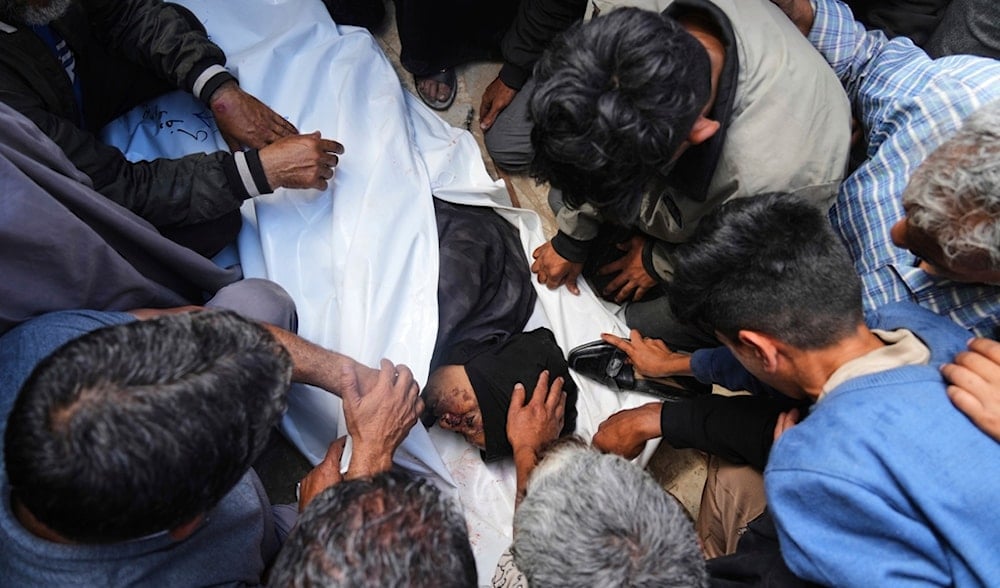'Israel' losing European support as it intensifies Gaza war: Bloomberg
European allies of "Israel", including Germany, France, and the UK, are reconsidering arms sales and trade deals amid rising criticism over the Gaza war and a deepening humanitarian crisis.
-

Palestinians mourn over the body of Reem Al-Akhras who was killed while heading to a Gaza aid hub, during her funeral at the Nasser Hospital in Khan Younis, southern Gaza Strip, Tuesday, June 3, 2025. (AP)
Some of "Israel’s" staunchest allies in Europe are increasingly voicing criticism over the ongoing war on Gaza, with major powers such as Germany, France, and the United Kingdom considering restrictions on arms exports and trade ties.
In a notable shift, Germany is now contemplating limiting military exports to "Israel", a departure from its long-standing policy that viewed support for "Israel" as a historical obligation post-Holocaust. According to information obtained by Bloomberg, frustration within the German government intensified after the occupation escalated military operations in mid-May while continuing to block humanitarian aid to Gaza.
German Chancellor Friedrich Merz publicly stated that the humanitarian situation “could no longer be justified by a fight against Hamas terrorism.” He spoke with Prime Minister Benjamin Netanyahu, emphasizing the immediate need to allow sufficient aid into the Gaza Strip.
Recent opinion polls across Europe reflect this mounting disapproval. In Germany, a survey by Civey for Tagesspiegel revealed that over half of the respondents oppose weapons exports to "Israel". Similar sentiments have emerged in other nations, fueling mass protests. The Netherlands, for instance, witnessed one of its largest demonstrations in recent years, with tens of thousands demanding an end to the war.
Julien Barnes-Dacey, director of the Middle East and North Africa program at the European Council on Foreign Relations, remarked, "It’s simply become impossible for most European governments to continue supporting Israel’s war despite strong ongoing commitments to Israel’s security."
Moreover, images of starving children, collapsed buildings, and the destruction across Gaza have dominated social media and news broadcasts, fueling public outrage and pushing European governments to reconsider their stance. The pressure to halt bombardment and increase aid access continues to mount.
Read more: West shifts tone on Gaza, but action remains absent: The Guardian
France, UK on board
At the same time, French President Emmanuel Macron and UK Prime Minister Keir Starmer have both issued strong statements criticizing the occupation’s actions in Gaza.
On May 19, France, the UK, and Canada released a joint statement denouncing the military campaign. “The level of human suffering in Gaza is intolerable… We will not stand by while the Netanyahu Government pursues these egregious actions,” the statement read.
Macron warned that unless the situation improves, Europe will need to harden its collective stance toward "Israel". His position has resonated with the French public, with an Odoxa poll showing nearly two-thirds of respondents support Palestinian statehood, with 61% backing sanctions against "Israel". Macron’s approval ratings have also risen, largely due to his Gaza stance.
France is also actively advocating for the recognition of a Palestinian state. This month, it is set to co-chair a United Nations conference in New York alongside Saudi Arabia in a bid to garner international support. The move is widely supported within France, home to Europe’s largest Jewish and Muslim communities.
EU debates sanctions, trade agreement review
In terms of trade relations, the European Union’s foreign policy chief, Kaja Kallas, announced in May that a “strong majority” supports reviewing the EU’s trade agreement with "Israel". Chancellor Merz followed by confirming that Germany is considering new restrictions on arms exports.
As the EU’s largest trading partner, "Israel" exchanged $47 billion in goods with the bloc last year, according to the International Monetary Fund. Any policy changes would significantly impact "Israel’s" already strained economy.
The UK, for its part, has paused free-trade negotiations with "Israel" and imposed targeted sanctions on individuals accused of committing violence against Palestinians in the occupied West Bank.
However, obstacles remain. Some EU member states, such as Hungary, oppose sanctions. European defense companies also risk losses if arms deals are cut, and retaliatory action by "Israel", a major exporter of air-defense systems to Europe, remains a possibility.
Controversy over aid plan, distribution
Bloomberg also noted escalated tensions over the US- and Israeli-backed proposal to resume aid distribution in Gaza. The United Nations criticized the plot, stating it would fail to meet the medical and nutritional needs of more than 2 million Palestinians and could politicize humanitarian aid.
The Gaza Humanitarian Foundation, a US-"Israel"-backed organization, began distributing aid last week. It claims that additional supply centers will soon provide sufficient food packages. However, aid distribution sites affiliated with the GHF have witnessed utmost chaos and bloodshed, with both Israeli occupation forces and US security forces assaulting starving Palestinians waiting for aid.
Despite the mounting casualties, "Israel" continues to justify the only approved aid scheme to "prevent Hamas from stealing aid," a claim that has been widely refuted.
While Europe reevaluates its policies, the US remains "Israel’s" most significant ally. President Donald Trump has maintained support for Netanyahu’s government but also reiterated his interest in stabilizing the Middle East and ending the Gaza war.
According to Rym Momtaz, editor-in-chief of Strategic Europe, “Trump could actually strengthen the Franco-Saudi push for Palestinian statehood because Palestinian statehood cannot happen without a ceasefire in Gaza.”
Netanyahu has responded angrily to European leaders, accusing Macron and Starmer of “inviting more such atrocities” on "Israel".
Read more: Europe confronts 'Israel' over Gaza, but action still remains stalled

 5 Min Read
5 Min Read








